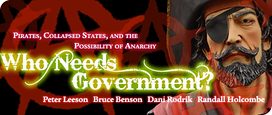The title I have used here is tongue-in-cheek, because we’re not moving toward anarchy. As any anarchist will tell you, the state is expanding, both in expenditures and in its regulatory powers. And, as I said in my first essay, many of our fellow citizens favor further state expansion. But, if Leeson and Benson want anarchy, how can they get there?
Dani Rodrik’s reaction to Leeson’s essay provides some interesting insights. He argues that no society can become prosperous without government, but even goes a step further to argue that there is a “complementarity between markets and the state. Those societies in which markets work best are the ones where the reach of the state is longer — not shorter.” He then provides some data showing a positive relationship between government consumption as a share of GDP and per capita GDP. For purposes of the present discussion, the most interesting thing here is that Rodrik is making that argument. This shows the challenge that Leeson and Benson are up against. Rodrik is not a “rationally ignorant” citizen who learns economics from watching the television news. He is one of the nation’s most prominent academic economists, and he already knows the theories and knows the relevant facts. So, it’s not a matter of just educating the public to the benefits of anarchy and then everyone will become anarchists. Rodrik’s response to Leeson shows that not all experts share his opinion on the virtues of anarchy.
I will take a paragraph to digress on the data Rodrik presented, because I don’t think it is very useful or relevant. For one thing, it measures the size of government by including only government consumption expenditures, but in prosperous economies most government expenditures are transfers and subsidies. The results would be similar if he looked at total government expenditures for all nations for the reasons Benson gives, but if one looks only at total government expenditures in developed economies, panel data shows that nations with higher government expenditures as a share of GDP have slower growth rates and lower incomes. [1] Furthermore, government consumption expenditures is not a good measure because there is substantial variation across countries in activities that are undertaken in the public versus private sectors. I don’t mean to pick too much on this example, because it is not presented as academic research, but rather as an illustration. I do want to say, however, that a closer look at the data would make that apparent relationship between larger government and prosperity disappear.
Now, back to anarchy. How are Leeson and Benson going to convince Rodrik that, despite the evidence he presents, anarchy is not only viable but would result in a more prosperous society than even a minimal government? Rodrik, after all, presents data to show that prosperity is associated with more government, not less. One way is to illustrate how market mechanisms can work better than government programs to do everything that government does. Then, present evidence, as Leeson does in his lead essay, to show that self-governance works better than you think. That gets Leeson and Benson part-way there, and Rodrick in his reaction to Leeson agrees that in the absence of government individuals have the incentive to develop institutions that allow them to interact for their mutual benefit.
The benefit of the libertarian-anarchist literature is that it knocks down the arguments that, in theory, government is necessary for an orderly society. Because I, personally, want less government, I am supportive of the work libertarian anarchists are doing. But whether they are right or wrong about anarchy is irrelevant from a policy perspective, because almost nobody living a comfortably prosperous life in a developed economy would be willing to give that up for an experiment in anarchy. And people who are struggling in prosperous economies want more government, to transfer resources from those who have more to those who have less. So, regardless of whether the anarchists are right, their ideas are irrelevant from a policy perspective.
In Leeson’s response to me, he asked how far we could take this reasoning. If it is unrealistic to think that the minimum wage would be repealed, should that stop us from arguing against it? In fact, I think those who favor smaller government can have the best success opposing specific programs like the minimum wage. We are more likely to succeed in scaling back government by showing why specific government programs, regulations, taxes, etc., are counter-productive than we are by arguing we should just eliminate government in total. We can actually succeed in cutting taxes, scaling back specific programs, and targeting specific regulations for elimination. Libertarian anarchist arguments are helpful in the abstract for moving in this direction, but not even anarchists themselves can view anarchy as a realistic policy option.
I am happy for Leeson to argue in support of a libertarian anarchy, and I am largely sympathetic to his arguments. But I don’t think those arguments are much of a threat to the status quo.
Notes
[1] James Gwartney, Randall Holcombe, and Robert Lawson, “The Size of Government and the Wealth of Nations,” Cato Journal 18, no. 2 (Fall 1988): 163-190.

